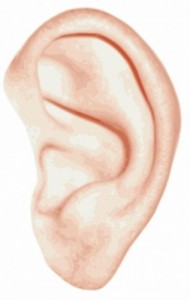By Mardy Chizek, RN, FNP, BSN, MBA, AAS
Continued from part 1 of this article…..
 Sudden deafness is a medical emergency that may be either totally or partially reversible if treated in time. See an otolaryngologist, audiologist or your family physician right away.
Sudden deafness is a medical emergency that may be either totally or partially reversible if treated in time. See an otolaryngologist, audiologist or your family physician right away.
The most common way to address hearing loss is use of a hearing aid. Hearing aids are electronic, battery-run devices that make sounds louder. There are many “hearing aid stores”, so it is best to see an audiologist, a professional who has expertise in hearing, hearing loss and hearing aids. The quality of hearing aid devises vary by manufacturer, so consult with an audiologist to help select a hearing aid that addresses the hearing loss and enhances acceptance of the device.
A hearing aid is not a panacea for hearing loss. Many hearing aids are lying in drawers rather than sitting in ears to assist with hearing. A hearing aid takes time to get used to. The hearing aid amplifies all sounds and the loudness and sounds may be overwhelming to the senior who has had gradual hearing loss. The ear mold may not fit properly and may need to be modified. The hearing aid is an electronic device and may need to be readjusted. Do not give up. Often a gradual process of getting accustomed to the new tool improves the success.
Worsening hearing can often be attributed to a hearing aid malfunction. The malfunction may be as simple as deterioration of the plastic tube leading from the ear mold to the hearing aid. Hearing aid batteries need to be replaced and a dead battery can be the culprit. Disengaging the battery from the hearing aid device when not in use will prolong the life of the battery.
Hearing loss is more than an inconvenience. There are many reasons for the senior and their family to work on options to improve hearing.
Finally, with a diagnosis from a healthcare or audio professional, a cochlear implant may be prescribed. A part of these electronic devices are surgically implanted under the skin. Most senior hearing loss cannot be improved with cochlear transplants, but a professional can tell you whether you are a candidate for the procedure.
Take hearing loss seriously
Hearing loss is more than an inconvenience. There are many reasons for the senior and their family to work on options to improve hearing. The social isolation caused by hearing loss should not be minimized. The hearing aids available today are smaller and more powerful and the stigma of wearing a hearing assistive device is less profound.
If you suspect a loved one’s hearing is compromised, get it checked out as soon as possible.
Mardy Chizek, RN, FNP, BSN, MBA, AAS is the president of Westmont’s Charism Elder Care Services. For more information on depression and dementia visit Charism Eldercare Services at www.charism.net.
